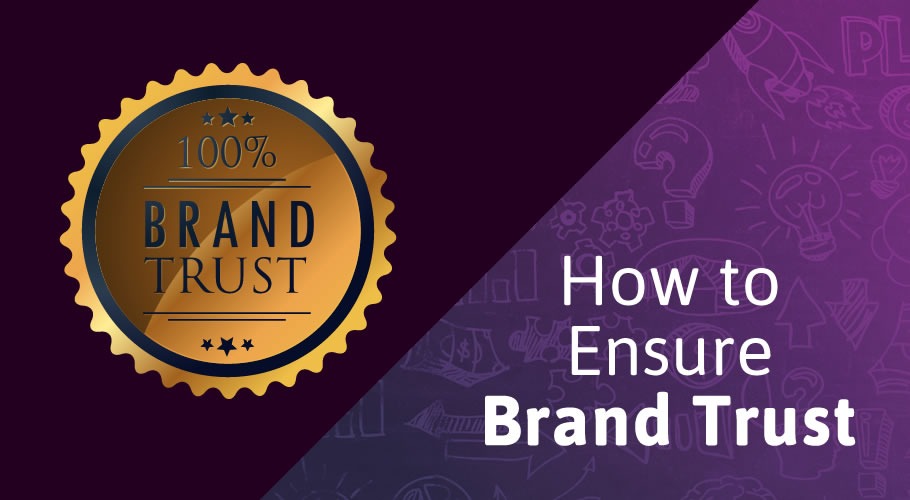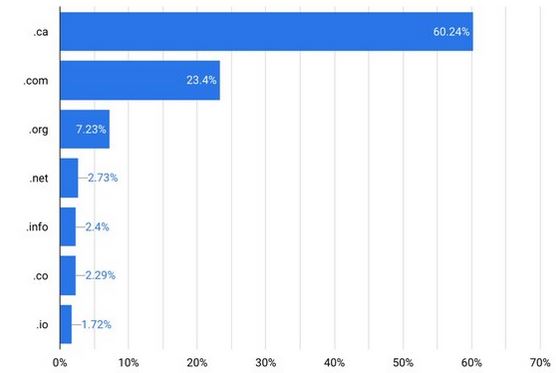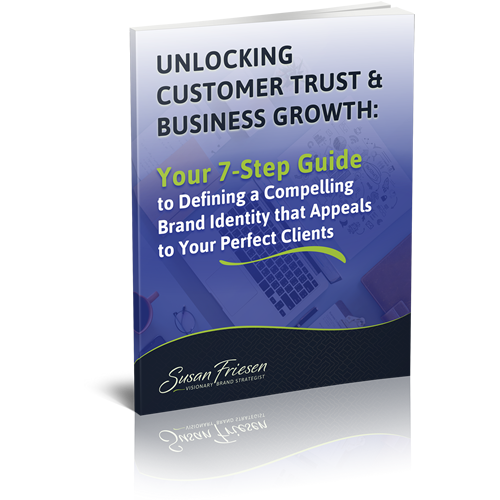In order to be taken seriously in today’s increasingly digital world, your business needs to have a website.
If it’s done right, having a website allows you to increase the visibility and awareness of your brand, helps you to build credibility, makes your brand look more professional and reliable, and acts as a convenient touchpoint between you and your customers, among many other benefits.
But from my perspective, the main purpose of a website is to help you get more leads, and by extension, get more conversions, as well.
However, you can’t just slap together a website over the weekend and expect it to inspire people to give you their hard-earned money.
If you have this type of website, it’s not likely to help you get more leads or conversions, and it could actually be doing more harm than good for your brand.
For example, as you can see from the graph below, a survey from Little Dragon Media found that the vast majority of Canadian consumers will not make a purchase from a company if it has a poorly designed website, as it makes them feel like they can’t trust them.

This may not seem particularly mind-blowing, but if you want your website to be doing what it should, then you’ve got to understand how to create a website that shows consumers you can be trusted.
I know that might seem like a pretty complicated ordeal, but the truth is, building trust through your website is one of the simplest strategies you can employ to get more leads and conversions.
So, if you’re wondering how to get more leads, how to get more conversions, or you’re just looking for practical tips to build customer trust, then you’ve come to the right place.
Because in this article, I’m going to explore several things you can do to build trust with your website, so it can be the lead and conversion-generating machine that it should be.
Can a Trustworthy Website Really Help Me to Get More Leads and Conversions?
I know you might still be questioning why this is so important, and this is especially true if you’re an old-school business owner.
But no matter how skeptical you might be, the reality is in today’s trust economy, one of the key factors in the decision-making process of consumers is determining whether or not a brand can be trusted.
So, the short answer is yes, a website that builds trust can help you to get more leads and conversions, not least because trust is becoming a much more important consideration in the minds of consumers.
At this point, you are probably wondering what it means to build trust through your website, and more importantly, how you can actually go about doing that.
If that sounds like you, then you’re in luck, because below, I’ve laid out several things you can do to build trust with your website.
READ: How to Ensure Consumers Trust Your Brand

When you’re trying to build trust in your brand, you’ve got to employ every tactic you possibly can.
But with so many different ways to go about doing this, pinpointing the approach that works best for you and your brand can be pretty tough.
So, if you’re looking for more ways to build trust with consumers, then this article is definitely for you.
It explores why trust is becoming increasingly important for brands today, and what makes a brand trustworthy, while offering several tips to help you ensure your brand can build trust.
Clean Copy
Believe it or not, one of the most important things you can do to build trust with your website is to ensure all the copy is clear, concise, and error-free.
This is a lot more important than you might think, as clean copy shows professionalism and lets consumers know that you can be relied on to do things right.
Because if your copy is riddled with errors, then potential customers are going to be asking questions like, “If they can’t even spell things right, then what else are they going to get wrong?”
On the other hand, if your copy is confusing, or tends to drag on and on, it’s going to make it more difficult for consumers to navigate your website, understand your offerings, or want to even bother reading about them, and as a result, many of them will simply move on and give their business to one of your competitors.
All things considered, if your website copy has any of these issues, then it’s going to make your brand seem less trustworthy because it makes you look like you don’t care or you’re not taking things seriously, and that’s definitely not going to help you build trust.
Relevant Content
When it comes to building trust with your website, it’s important ensure all of the content is relevant to your target audience and what you have to offer.
Regardless of whether it’s visual, textual, or something else entirely, having relevant content helps to build trust because it lets potential customers know that you understand them, are able to help them fulfill their desires or solve their problems, and demonstrates that you’re an expert in your field.
But if your website contains content that’s not relevant, then it’s going to have the opposite effect.
For instance, if you’re trying to sell something to people over the age of 50, then your website should contain imagery that prominently shows this demographic.
Because if your target audience lands on your website, only to find a bunch of photos of people half their age, then the imagery is not going to speak to them, and it’s going to make it look like you don’t understand your own audience.
Moreover, if your website is providing relevant content, like informative articles or compelling videos, then this can help to increase engagement because it provides value and gives users a more personalized experience.
This can also help to build even more trust because consumers will be more likely to recommend your business or share your content, which can help you to build greater awareness of your brand.
Fast Load Times
Another effective way to build trust through your website is by ensuring it loads as quickly as possible.
This is something that’s often overlooked, but its importance has been well documented.
For example, according to data from Google, if a website takes three seconds to load, the probability that users will leave increases by 32 per cent, compared to a website that loads in just one second.
A big part of the reason for this is that a website that takes a long time to load sends a subconscious message to consumers that you’re probably slow in other areas of your business, like answering the phone, responding to complaints, or delivering orders, and this is not going to inspire trust.
With that in mind, if your website loads quickly, aside from stopping your business from looking sluggish, it can also help to build trust in many other ways, like providing a positive experience for users, and conveying professionalism, attention to detail, and reliability.
What’s more, having faster load times can also be a sign of a more secure website, as websites that load quickly are typically optimized for performance, meaning they’re more likely to have put measures in place that help to improve website security and protect consumer data.
Trust Badges
While adding a few images to the footer of your website might not seem like the best way to build trust with consumers, the truth is, it can be highly effective.
For example, a trust badge could help to build trust by showing that your company has met the necessary criteria to be validated by a relevant third-party, or is associated with other well-known brands or organizations.
In any case, having these badges on your website sends a subconscious signal to consumers that you can be trusted, especially if they’re well-known and recognized by consumers.
This can include badges from organizations like the Better Business Bureau, those that indicate that your online store is secure, or badges that show commitment to some sort of guarantee, just to provide a few examples.
On our website, we have several trust badges, including a Google Partner badge, and several badges associated with awards we’ve won from local business organizations.
Whatever you choose to include, make sure it’s relevant to what you have to offer, and as recognizable to consumers as possible.
Domain Extensions
For those of you who aren’t familiar with the term domain extension, or TLD, it refers to what comes after the dot in your website URL.
There are all kinds of different options, including .net, .org, .co, and of course, .com, which is used for the majority of websites.
In recent years, tons of additional extensions have come into existence, but at the end of the day, .com is the most well-known, and the most trusted, and if you’re using anything else, it could make consumers suspicious of your website.
However, there are many factors that need to be considered, and depending on your industry, location, or target audience, this may not be true for you.
For example, another survey from Little Dragon Media asked Canadians which domain name extensions they trust the most, and as you see from the graph below, the vast majority chose .ca.

With that in mind, when you’re choosing your domain extension, you’ve got to consider whom it is you’re targeting.
For instance, here at eVision Media, although we work with businesses from all over North America, most of our clientele is Canadian, so we chose to use .ca, as it’s the Canadian domain extension, and the one that’s most trusted by consumers in this country.
So, if you’re trying to build trust with your website through your domain extension, make sure to consider the nature of your organization or industry, the audience you’re targeting, and your location.
And if you just can’t decide, you’re probably better off going with .com.
Are you struggling to figure out how to show that your brand can be trusted? We’ve been helping business owners to build trust with consumers for more than 20 years. Contact us today to find out more about what we can do for you.
To your business success,
Susan Friesen
P.S. If you liked the article, you might want to subscribe to our newsletter. We publish tons of valuable content to help you learn more about marketing, and subscribing is the best way to ensure you don’t miss out. Additionally, if you’d like to learn more about building a search engine optimized website, click here for our free website guide.







